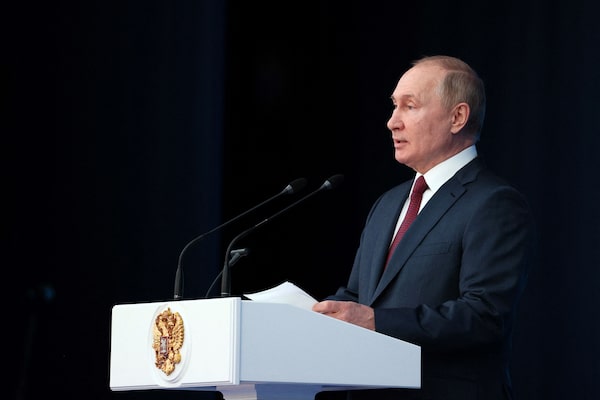
Russian President Vladimir Putin delivers a speech during an event marking the 300th anniversary of Russian prosecution service, at the State Kremlin Palace in Moscow on Jan. 12, 2022.ALEXEY VITVITSKY/AFP/Getty Images
Talks aimed at averting a second Russian invasion of Ukraine have become deadlocked over President Vladimir Putin’s insistence that Moscow deserves, and indeed was once promised, a Cold War-style buffer zone that gives it some control of countries adjoining Russia’s borders. While it is worth making some compromises to ensure peace in Eastern Europe, this concept is a fiction that should never return to international politics.
The notion that Russia has a right to a “sphere of influence” encompassing independent countries around its perimeter – specifically, the countries that were once controlled by the regime that occupied Russia from 1917 to 1991 – was first articulated by Mr. Putin’s government in 2008 during the Russian invasion of Georgia.
This year, it has led him to demand Western countries promise not only that they won’t arm Ukraine, but that Ukraine and other Eastern European states will never become members of the North Atlantic Treaty Organization. The “sphere of influence” concept was also used this week to justify Russia’s intervention in the popular uprising against Kazakhstan’s increasingly authoritarian government. As a result, the Kazakhs were crushed and the regime restored.
The idea that militarily powerful countries deserve a “sphere of influence” is a colonial concept that reached its zenith during the Cold War – the 1945 Yalta Conference, which gave the Soviet Union control of most of Central Europe and part of Germany, was built on this concept, and the Cuban Missile Crisis was part of the U.S. effort to enforce the idea in its own periphery (largely unsuccessfully – Mexico, Cuba and Canada remained largely beyond Washington’s political control).
Today, the concept has backers of various sorts within Russia, including ethnic nationalists who believe Slavic-speaking countries are part of a racially defined “Eurasia,” and Soviet revanchists who believe modern Russia is a continuation of the USSR. Mr. Putin first toyed with the former idea, and in recent years has used speeches and negotiations to promote the latter, all in the name of stopping the international aspirations of nearby countries.
It also has some backers in the United States, Canada and other Western democracies. After the people of Ukraine rose against their pro-Moscow regime in 2014 over their desire to become part of the European Union, a number of scholars and politicians argued, in the words of University of Chicago political scientist John Mearsheimer, for peoples in Russia’s orbit, “abstract rights such as self-determination are largely meaningless.” Luckily, that view did not prevail.
Mr. Putin and his backers take this further, insisting newly democratic Russia was given a guarantee, when the Soviet empire collapsed, that NATO wouldn’t expand east of its Cold War borders.
That myth is the subject of Not One Inch: America, Russia, and the Making of Post-Cold War Stalemate, a new book by Mary Elise Sarotte, a Cold War historian at Johns Hopkins University. Its title refers to a negotiating point that was made by former U.S. secretary of state James Baker to Mikhail Gorbachev in February, 1990 – if Moscow were to remove its troops from East Germany, he said, then NATO will “not shift one inch eastward from its present position.”
Gorbachev the liberator was a misfit among Russian leaders. Putin proves it
But that pledge was made when Mr. Gorbachev was the leader of the Soviet Union, and strictly in the context of German reunification. As Mr. Gorbachev has subsequently said, and as Dr. Sarotte shows, no such promise was ever made to leaders of independent Russia, nor did they generally desire one – although she also shows U.S. dealings in these respects were far from square.
That hardly matters, though, since Russian leaders before Mr. Putin did not see the geographic expansion of NATO as a threat, but as an encouraging promise. It was widely assumed by Russian officials in the 1990s that their country would eventually become a member of NATO. After all, that is what an emerging liberal democracy does – it joins international co-operative organizations, including ones for mutual defence. Turkey did it in the 1950s, why wouldn’t Russia?
As late as 2004, Russian military officials told me they expected their country to join NATO some day. After all, they shared the same military threats as the U.S. and countries in the EU. Why wouldn’t the Russian people, who had successfully overthrown the Soviet thugs, share their view of NATO?
The U.S. and Europe did fail Russia on this front. But it wasn’t by allowing NATO and the EU to expand eastward. It was by forgetting to ensure expansion, and the better life that comes with it, included Russia all along. Let’s not forget Russia’s genuine sphere of influence, when normal times return, ought to be the same as ours.
 Doug Saunders
Doug Saunders